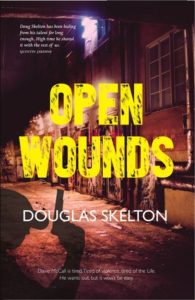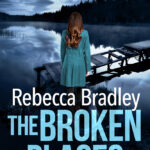Today I’m pleased to welcome to the blog, crime writer, Douglas Skelton.
 Douglas Skelton is the author of 11 true crime/Scottish criminal history books, four titles in the Davie McCall series and now the Dominic Queste thrillers, the second of which – Tag – You’re Dead – will be published by Contraband in April. His final Davie McCall book, Open Wounds, was nominated for the McIlvanney Award in 2016.
Douglas Skelton is the author of 11 true crime/Scottish criminal history books, four titles in the Davie McCall series and now the Dominic Queste thrillers, the second of which – Tag – You’re Dead – will be published by Contraband in April. His final Davie McCall book, Open Wounds, was nominated for the McIlvanney Award in 2016.
You can find his First Draft process Here.
Your first draft has been completed, what state is it generally in?
Everything’s there. Well, more or less. I’ve taken it from A-Z, the spine of the story is there, the characters, much of the dialogue. I don’t have gaps – I tend to write in linear fashion and don’t jump sections. There will, however, be segments that will be cut.
What is the first thing do before you start to revise?
Take a deep breath. Then a drink. Then I read it through once, take some notes. I don’t print it up yet – that’s done after the second, maybe third, draft.
How do you assess the damage that needs working on?
Instinctively. I don’t have a particularly cerebral approach to what I do, it’s all by gut. Most writers know when something is just not right. Although sometimes we think something is wonderful and really, it’s not.
Do you allow anyone to read that very first draft before revisions or can you assess it objectively yourself?
Hell, no! I can be fairly objective, although that doesn’t mean I don’t cling to material that my editor will later gently prise from clammy hands.
What do you initially focus on, when approaching the completed first draft of the manuscript?
The spine of the story. William Goldman once wrote that once you have that everything else is fixable, and I think it’s great advice. As long as it’s intact, everything else can be moved, sliced, added to, turned into English.
Do you have any rituals, writing or real-world, when revising a manuscript?
None at all. I’m a tough Scot and don’t hold with such things. Touch wood.
In what format do you revise, paper or computer?
All on screen until it’s printed up further down the line.
How messy is the revision process – can you go in and repair areas or does the whole manuscript get decimated?
It’s patchy. Some areas can be left as they are, others go all General Maximus Decimus Meridius and unleash hell.
Is revision an overhaul of the story or is it minor editing?
It’s more playing keep or chuck. As I say, as long as I’m satisfied the story progression is what I want then it’s more a matter of making sure I don’t slow down the pace – for me pace is vital – that I like the dialogue and am satisfied with the characters.
What’s the biggest change you’ve made to a story during this process?
In the first Davie McCall book, Blood City, I decided not to kill off a character I’d planned to kill off from the beginning. That character made it to the second book before the end came.
When first drafting, many writers keep track of progress by counting words in a day. How do you make sure you’re progressing as you’re revising?
I try not to put myself under pressure at all. I prefer to let it flow, so some days I’ll do very little but others it really works. As long as I complete it within a time frame I’ve already set, I don’t sweat the day-to-day stuff.
Do you prefer to write the first draft or do you prefer the revision process?
I much prefer revision. It can be easier. Pulling the material out of thin air to fill that blank screen is hard.
What do you drink while you’re working?
I’m getting on now so I limit myself to one cup of tea and two coffees during the day. At night the whisky comes out!
How long does this process take and what shape is the book now in?
I can take up to three months, sometimes longer, to get the first draft down. The second draft will be completed in two/three weeks if I’m on a roll. After the second draft it’s almost there but being me I will think of new lines to add in. After that the revision of a printed copy will throw up how much repetition there is and some fairly horrendous spelling and grammar. And how much repetition. Maybe I should’ve printed this out.
Thanks for taking the time to answer my questions!
You can find Douglas on his Website | Twitter | Facebook
Open Wounds
 Davie McCall is tired. Tired of violence, tired of the Life. He’s always managed to stay detached from the brutal nature of his line of work, but recently he has caught himself enjoying it. In the final instalment in the Davie McCall series old friends clash and long buried secrets are unearthed as McCall investigates a brutal five-year-old crime. Davie wants out, but the underbelly of Glasgow is all he has ever known. Will what he learns about his old ally Big Rab McClymont be enough to get him out of the Life? And could the mysterious woman who just moved in upstairs be just what he needs?
Davie McCall is tired. Tired of violence, tired of the Life. He’s always managed to stay detached from the brutal nature of his line of work, but recently he has caught himself enjoying it. In the final instalment in the Davie McCall series old friends clash and long buried secrets are unearthed as McCall investigates a brutal five-year-old crime. Davie wants out, but the underbelly of Glasgow is all he has ever known. Will what he learns about his old ally Big Rab McClymont be enough to get him out of the Life? And could the mysterious woman who just moved in upstairs be just what he needs?



This is really interesting! Thank you, both. And I like that idea of starting the revision process with the spine of a story. That makes a lot of sense to me. I can see how the rest of the revision process falls out from that.
Interesting to know how the magic is woven. Loved Open Wounds! One of my books of the year last year and I still think it should have won the McIlvanney Prize! Oops, sorry, I’ll stop fangirling and go now… 😉